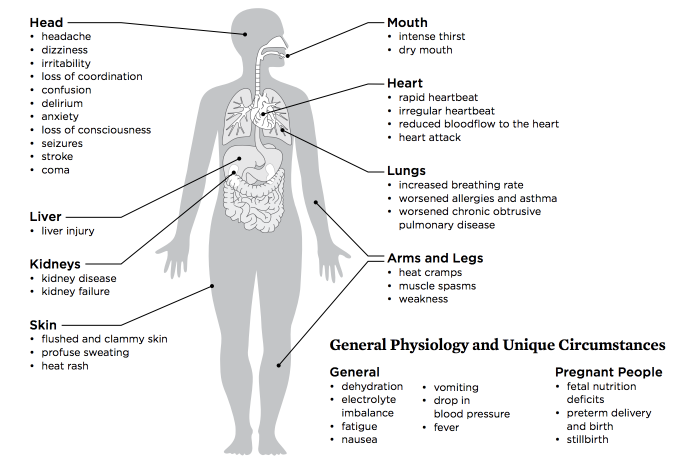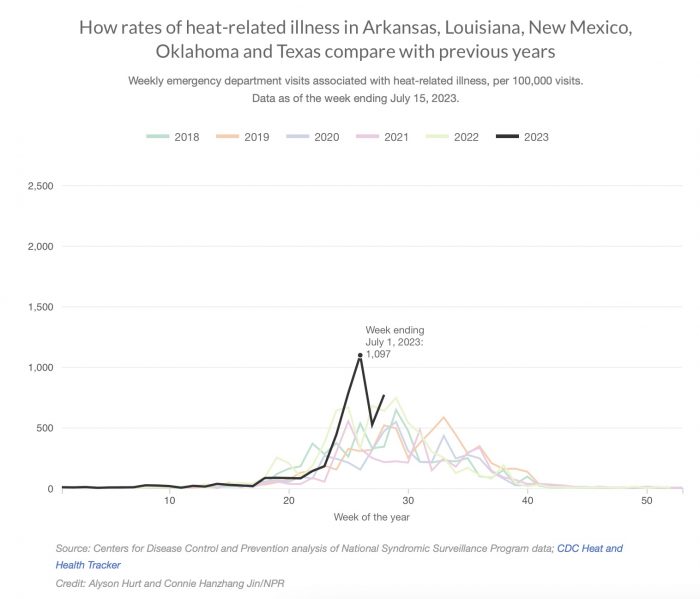In all the apocalyptic movies made on climate change, one thing is clear — global warming is survival concern. We’ve seen glaciers melting, floods wiping out towns, mega-storms, people running from lava and wildfire, and an ice-age of sorts, but never any plot line on what happens to human health in the days leading up to these disasters.
Having lived with chronic and mental illness, I’ve always had an adversarial relationship with heat. As summer temperatures break records around the world, and with the UN Secretary-General António Guterres announcing that “the era of global warming has ended” and “the era of global boiling has arrived,” we decided to dig deeper on this topic.
How does heat impact our health?
A healthy human body functions efficiently when the core temperature is around 37ºC or 98.6ºF. Extreme heat strains the heart and kidneys as they attempt to cool down the body. This could cause an electrolyte imbalance, and you experience symptoms like fatigue, nausea, or headache.
Prolonged exposure to higher temperatures, and the resulting stress on our body to thermoregulate, can damage our organs leading to dehydration, vomiting, delirium, heat exhaustion, heat stroke, heart attack, and even acute kidney failure.

Hotter nights also impact our sleep quality, which in turn has been linked to inflammation, weakened immune system responses, and susceptibility to chronic and mental illness.
In people with good mental health, heat can impact the ability to think, which can lead to frustration, aggression, anxiety, and depression.
Data shows a spike in emergency room visits.
Heat can kill. When it doesn’t, it sends more people to the emergency room, not just from dehydration and infection. The strain on the body can cause physical fatigue, irritability, impaired judgment, lethargy, vigilance decrement, and loss of dexterity, coordination, and concentration. This could in turn cause accidents, fights, and workplace injuries.
Chronic exposure to heat can trigger as well as worsen chronic health conditions, from migraine, fibromyalgia and rosacea, to asthma, hypertension, lupus, rheumatoid arthritis, type 2 diabetes, cardiovascular disease, chronic obstructive pulmonary disease, and chronic kidney disease. It has been linked to rise in symptoms for people diagnosed with anxiety disorder, depression, bipolar disorder, and schizophrenia.
According to a recent Centers for Disease Control and Prevention (CDC) analysis, the rates of heat-related emergency department visits were the highest seen in Arkansas, Louisiana, New Mexico, and Oklahoma this June, compared to the past five years. This supports a 2018 study that postulated a minimum 10% increase in hospital emergency room visits when temperatures reach or exceed the top 5% of the normal temperature range for a specific location.
The intense heat wave in the Southwest has seen people visiting the emergency rooms with burns from roads and doorknobs. As the power grids continue to be overwhelmed, more regions are experiencing blackouts, with people unable to protect themselves from higher temperatures, even indoors. This situation is now reaching deadly heights.
Who is more vulnerable to these rising temperatures, and why?
While these sweltering days can cause stroke even in healthy people, some other populations are at higher risk including children, pregnant people, athletes, unhoused populations, people who work outdoors, those lacking access to good community and health services, those exposed to wildfire smoke and high levels of pollution, and people living, studying, or working in buildings that are not equipped to handle extreme heat.
Those of us with chronic and mental illness or disabilities are more vulnerable to heat waves due to various physiological and behavioral factors that make it challenging for our bodies to cope with extreme temperatures. Here are some reasons why we are at higher risk:
- Thermoregulatory dysfunction: Many chronic illnesses and certain medications can impair the body’s ability to regulate temperature effectively. This makes it harder for us to cool down during hot weather, leading to a higher risk of heat-related illnesses.
- Dehydration susceptibility: Some chronic conditions and medications can increase the risk of dehydration, which coupled with excessive sweating caused by heat can lead to a dangerous loss of fluids and electrolytes.
- Medications and heat interactions: Certain medications, especially those affecting the cardiovascular and central nervous systems, can hinder the body’s response to heat stress, making individuals more vulnerable to heat-related health issues.
- Limited mobility and access: We may have limited mobility or face challenges accessing temperature-controlled environments, making it harder for us to escape extreme heat.
- Sensitivity to environmental changes: We may have heightened sensitivities to environmental stressors, including changes in weather and temperature, which can exacerbate our symptoms during heat waves.
- Cognitive impairments: Some chronic and mental illnesses can affect cognitive functions, impairing decision-making abilities. This can keep us from taking appropriate actions to protect ourselves from heat-related risks.
- Social isolation: We may be more socially isolated, limiting access to support and assistance during extreme weather events.
- Weakened immune systems: Chronic illnesses and certain medications can weaken the immune system, making us more susceptible to infections and illness that can be triggered or exacerbated by heat.
- Increased stress: Heat waves can be mentally and physically stressful for anyone, but for those of us with chronic and mental illness, the added stress can worsen our conditions and overall well-being.
- Limited awareness: Some of us may not be fully aware of the risks posed by extreme heat, making it less likely to take preventive measures.
12 Coping Strategies for Staying Healthy in a Boiling World
From childhood to adulthood, I can’t count the number of times I’ve fainted on hotter days, or the times I’ve screamed from pain during migraine attacks brought on by exposure to heat. I’ve relocated several times, from Southern India to Canada, in the hopes of finding relief from heat, a trigger that has complicated my mental and physical health to an extent where it impacted my relationships, career, and will to live. The worst thing about heat is that it makes people irritable, making it harder to find support when you most need it, especially if you are at risk and need assistance.
Here are some coping strategies to help you protect yourself from this unprecedented weather.
- Stay hydrated: If you live with chronic illnesses, mental health conditions, and/or disabilities, you might have difficulties with mobility or memory. Set reminders to drink water regularly. Use water bottles with time markers or set alarms to prompt hydration.
- Temperature-regulated environment: Ensure access to a temperature-regulated environment, such as air conditioning, fans, or cooling centers, to help manage heat sensitivity and avoid heat-related complications.
- Medication management: Some medications can affect how the body responds to heat. Consult with health care providers to understand if any medications need adjustments during hot weather and to monitor for signs of dehydration.
- Caregiver support: If you rely on caregivers for assistance, educate them on the risks of heat waves and how to provide adequate support during such conditions.
- Emergency plan: Create an emergency plan that includes specific instructions for caregivers or family members on treatment or how to respond in case of heat-related emergencies.
- Limit physical exertion: Consider engaging in light exercises indoors or opt for activities that don’t involve exposure to extreme heat.
- Emotional support: Extreme heat can exacerbate mental health conditions. Seek emotional support from friends, family, or mental health professionals during such times.
- Sensory sensitivities: If you experience sensory processing issues, you may find the extreme heat overwhelming. Create a comfortable sensory environment indoors and use cooling products that don’t cause sensory discomfort.
- Communication plan: If you experience communication challenges, use a suitable communication aid, or get help from a loved one to express your discomfort or need for assistance during hot weather.
- Evacuation plan: If living in an area prone to heat waves, have an evacuation plan in place if you need assistance leaving your home safely.
- Community support: Connect with other Mighties to share experiences and receive guidance on managing extreme heat.
- Stay informed: Stay updated on weather forecasts and advisories to plan for heat waves in advance and make necessary arrangements for safety and comfort.
Everyone’s needs may vary, so it’s essential to personalize coping strategies and treatment based on your specific condition and challenges during extreme heat events.
Getty image by Kanok Sulaiman


